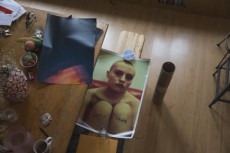NY Issue : Interview with Chad Moore
NeoL / 2017年11月8日 17時0分
親密な空気の中でだけ沸き起こる美しい瞬間を収めた写真で、日本でも多くのファンを持つ写真家のChad Moore。彼本人のように穏やかで光に満ちたスタジオで、写真へのスタンスと現状について聞いた。
ーーあなたの写真を見るといつもどうしてか泣きたいような気持ちになります。そのように心の奥底に触れるための写真を撮る魔法を教えてもらいたいです。画角や構図などのテクニック的なところと、より感覚的なところとで、あなたならではの独自の写真にするための方法とは?
Chad「ありがとう。そう思わせることができるのは、10年近くずっと同じ人たちを撮ってきて、彼らと信頼関係を築けているからじゃないかな。なにしろ写真でもフォトブックでもずっと同じ人たちが写っているんだ。たまに 『今は写真を撮らないで!』と言われる時もあるけど、コラボレーションというか、友人たちは僕に撮られるのに慣れているから、モデルと仕事をする時の堅苦しい感じとは全く違う。パーソナルな作品に見えるように、彼らが自然体でいられるようにするのが大切なんだ」
ーーだから秘密をのぞいているような感じがするのかもしれない。被写体との距離の近さと写真の出来栄えは相互関係があるんですね。
Chad「うん、距離は大事だと思う。趣味として始めたことが仕事に発展したけど、本当はただ自分と友達のために写真を撮りたいし、生計のための仕事をやらなくても暮らすことができたらいいのにとも思う。好きな人たちの写真を撮るのは、広告やファッションの撮影をするのとは違うよね。個人的に撮っているものは、ティルダやマシューみたいに、同じ人たちがずっと映ってくれていて、長期に渡って作品を作り上げている感じがする。とてもパーソナルでありのままなんだ」
ーードキュメンタリーでもなければ、作り込まれた作品でもないフィクションとノンフィクションの狭間、もしくは夢と現実の狭間のような写真だと思います。写真におけるその両者のバランスについてどのように考えていますか。
Chad「ありがとう。とてもいい質問だね。多分、自分が存在する現実の世界と理想とする二つの世界があるからかな。だから、実際よりちょっとマジカルに見えるものもある。でも現実に起きていることにフォーカスしたい時もある。それにうまくコントロールできなくても、編集を通していい写真を選んだら、全てが完璧なように見せることができるよね」
ーーあなたの作品には儚さを感じます。あなたがそうしたものに惹かれているからでしょうか。
Chad「儚さかに惹かれてるかは分からないけど、永遠に消えてしまいかねない思い出を残すために写真を撮っている。多くの写真を撮るけど、多分その内の0.5%くらいしか作品にはならない。一時期は週にフィルムを30本ほど使ってたけど、その中から一枚しか使わなかった。でも、他の写真があることによって思い出をほぼ完璧に記憶できるんだ」
ーー同時にまるで小説や映画のように、1枚の写真の奥にさらに広がる物語が感じられる作品ばかりです。その広がりはどのようにしたら生み出すことができるのでしょうか。
Chad「意図的にそうしたわけじゃないんだ。一枚だけで伝わる作品もあるけど、ほとんどは数枚を繋げて伝わる感じだから、本を作るのが好きなんだよね。写真一枚より、全体を通してのストーリーがあるから。でもそのストーリーも決まったものがあるわけではなく、写真を見た人たちが自分にとっての意味を考えて作るものだと思っている」
ーー陰影と色(特に赤の使い方)も独特ですね。それらは撮っていくなかで培われたものですか。
Chad「自然に培った面も、他に見習った面も、両方ちょっとずつある。赤の使い方に関しては、若い頃によくクラブやバーに出かけていたんだけど、真っ赤な照明が多くてその写真映りが格好よかったんだ。それに気づいてから、雑誌なんかの撮影をする時にも赤い照明を当ててみた。でも飽きちゃったから、前ほど赤い照明を使ってないよ。他の写真家も赤い照明を取り入れ始めたしね。あれはフィルムを前露光して撮影していたんだ。光を見た直後に素早く目を閉じたら、瞼を閉じているのに赤っぽい色が見える時あるだろう? そして、その後に目を開けた時、まだ自分のまわり全てが少し赤っぽく見える感じ。あれを写真で再現したかったんだ。そうした再現をどうしたらできるかということで他の人の作品を見たりもしたけど、いつもはまわりのリアルな世界を自分なりのやり方で写真に落とし込んでる」
ーーその場の自然な光や影を利用することが多いですが。それとも、セットアップすることが多いですか。
Chad「写真の撮り方が変わったから、その時によるかな。若い頃は趣味として写真を撮っていたから、友人たちの自然なタイミングを待っていたけど、今は仕事として写真を撮っていて締め切りもあるから、前みたいにゆっくり待っていられないんだよね。どうやったら自然に見えるようにセットアップできるか、いつも考えている。”リアル”な写真と”セットアップ”写真の境界線を漂っている感じ。例えば、AmazonでDJ用のカラフルなライトを買ったんだけど、いろんな設定をして遊んで、スタジオで撮影するんだ。昔の写真に似ているけど、意図的にちょっと準備してるって感じでね」
ーーセレクトや編集、加工などの撮影後の作業での独自性を出すための方法やルールはありますか。
Chad「ハイレゾルーションでスキャンすることが唯一の決まりかな。最近、ハイレゾの写真を撮る人ってあまりいないしね。写真は自分のスタイルを常に確立し続けないといけない面では最も難しいアートだと思うけど、技術的には最も簡単だと思うんだ。オイルペイントみたいに学ばなくていいし、誰でも写真を撮って、ハイレゾのプリントを作れる。でも、今はプロでも、あんまりハイレゾの作品を作らないよね。あんまり編集したりはしないけど、フィルムを使っているからこんな感じの写真ができるんだ。トリックなんかはない。カメラの光を調節したりはするけど、それも決まりはない」
ーーどんなカメラを使っていますか?
Chad「色々使うけど、Yashica Y4やContax T2のような小さなものを持ち歩くことが多いかな。オートフォーカスのね。コントロールしやすいから、たまにこのサイズのレンズのCanonも使うよ。最近DiegoのRSVを使ってみたけど、大きくて持ちにくいから自分のスタイルにはあんまり合わないかな」
ーー小さいカメラは撮られる人があまり構えないからいいと言っていましたよね。
Chad「うん。フラッシュはあるけど、このサイズは存在感が強すぎないからね。あとでDiegoの大きいカメラで撮られるのも、ちょっと緊張しているんだ。ドーンって感じだから(笑)。でも良い緊張感かな。どっちも良さがあるよね。Avedonは8x10で本当に美しい写真を撮って胃た。でも、彼は僕より激しい人なのかもしれない。エネルギーを人からちょっと強引に引き出す感じだけど、自分の写真はもう少し自然な感じである必要がある。写真を撮られるつもりもなく普通に遊びに来る友達もいるし、プライベートなスペースに大きなカメラがあったら『写真を撮られるために会いに来てないんだけど』ってことになりうる。だから、小さい方が楽。被写体との距離も近いし。大きいと、会話もしにくいよ」
ーー作品ではよく若者を撮っていましたが、ユースカルチャーについてどう考えているか聞かせてください。
Chad「今のユースは正直つまらないと思う。みんな90年代の若者を真似しているように見える。パッと見てその時代らしいスタイルがあると思えるのは、90年代が最後じゃないかな。僕も30歳だから、そんなに90年代の記憶がそんなにあるわけではないけど、『それ、90年代だね!』という明快なイメージがある。でも2000年以降は特徴があまりない。質問の答えに戻ると、ユースにはあまり興味が湧かない。僕はずっと撮り続けている友人たちを、彼らが40代になっても変わらず撮っていると思う。みんながユースに着目する理由はなんとなく分かるけど、共感はできない。
若かった頃の自分に満足していないから、若さに惹かれてるって人も多いんじゃないかな。でもその過ぎたポテンシャルについて考えすぎると、人生をダメにしてしまう気がする。変化を受け入れないといけないと。不思議だよね。特にファッション業界の仕事をすると、若さへの食いつき方がすごい。若さって、売れるんだよね。でも僕は年をとることも素敵だと思うよ。さっきも言った通り、最近30歳という節目を迎えたから、前と同じようにはできなくなったこともあるけど、じゃあ逆にこれから何をできるかを考えることもいいと思うんだ。素晴らしい写真家であるリチャード・アヴェドンは若者を被写体にしない。人生経験が浅い人を撮ってもつまらないから。年をとると顔の皺からもストリーリーが伝わってくるからね。自分も19歳だった時は友達の写真を撮るのが楽しかったけど、今も続けようとは思わない。もちろん撮りたい人は撮ってもいいと思うけどね」
ーー確かにユースはとても消費されている気がします。あなたの写真は本当に美しいけれど、どういう瞬間が最も美しいと思いますか。
Chad「人それぞれによって美しさの定義は違う思う。僕にとっての美しさは、アシスタントのDiegoとは全然違うし、愛する人を見た時に何が見えるかによるんじゃないかな。大切な人がなにか考えてる姿や、喜んでいる姿は本当に美しいと思う。他人がいいと思わなさそうな写真でもね。だからさっきも言った通り、撮った写真のごく一部しか作品にならないんだ。本や展示では良さが伝わりにくいから他人に見せない写真でも、自分の中では最高だと思うものもたくさんある。それに思い出を持つことができるしね」
ーーではあなたにとって「美しい写真」とは?
Chad「いろいろあるよ。ドキュメンタリー写真でも、写っているのは現実じゃない。現実というより、撮影した人が存在したリアルな瞬間。川内倫子の写真は本当に素敵で、『そう、これが人生!』『花を見るというのは、こんな感じなのか!』と思える。ノスタルジーではないけど、以前に感じた何かをつかむことができる。写真を見ているだけのに、花の香りが分かったり、睫毛が風にそよぐ写真を見て風を感じたりね。リアリティを感じられる。写真は現実じゃないけど、見た時に『その気持ち、わかる!屋上に立った時
や冒険している時の気持ちだよね』って。写真の美しさはそういうところから喚起されるんじゃないかな」
ーー写真もそうですが、あなた自身がとてもロマンティックな人だと思いながら答えを聞いていました。昔からそんなにロマンティックなんですか?
Chad「あはは。うん、そうなのかな。さっきも言ったけど、写真で現実と理想を繋いでるような人間だからね」
ーー9歳の頃からBMXもやっていたんですよね?
Chad「そう。昔はプロフェッショナルとしてやっていたけど、NYに来た頃にやめたんだ。でも、今もたまに乗るよ。最近久しぶりに乗ったら怪我しちゃって、ホチキスで傷をとめたんだ。ほら」
ーーうわっ、痛そうですね。そうやってフィジカルさと精神のロマンティックさが同居しているのがすごく興味深いです。
Chad「BMXやスケボーは個々人でやるものだから、アメフトなどかのチームスポーツとは違うと思うんだ。聴く音楽、着る服、出会う人にも影響してくるし、写真や映像とも繋がってくる。例えば、Diegoはスケボーの映像を撮るんだ。BMXもスケボもとてもアーティスティックで、やっている人のほとんどが絵や写真などの他のアートもやっているんだ。フィジカルなスポーツだけど、競争ではないし、写真と似てるし、並行できるものだよ」
ーー15歳から撮り始めたそうですが、その頃と変わってないことと変わったことを教えてください。
Chad「わからないな。ずっと進化していくんだと思う。なにをやりたいか、自分らしさとは、自分のビジョンとはーーそういうことを考えながらね。完璧な瞬間を待つのには飽きてきて最近はセットアップしてるけど、本当に起きたことなのかスタジオで撮った写真なのかはわからないように境界線をぼかしてる。夜空の写真を好きになったり、新しいことにも興味を持ち始めた。常に変化しているのは楽しいし、ストレスでもある。次に何をしようかと悩むことある。あるスタイルが気に入られても、本当にやりたいことが違ったりするかもしれないしね。でも、それをどうバランスをとっていくか考えるのは楽しいよ」
ーーでは、あなたにとって写真とは?
CHad「ストレス(笑) 。世の中と繋がる方法かな。たまにメッセージを送ったり。Planned Parenthoodという女性に無料のヘルスケアを提供しているNPOをドナルド・トランプの政府がつぶそうとしているんだけど、僕はポスターを作って、その売り上げをPPに寄付しようと思ってるんだ。今はそういうことができるプラットフォームがあるからね。大阪にあるStandard Booksの店長さんが50枚くらい買ってくれるらしいよ。写真を通して人と繋がって、何かを変えたいんだ。でもやっぱり儚い記憶を繫ぎ止めるというパーソナルな意味が大きいかな」
ーーいま進行中のプロジェクトと、最新のニュースがあれば教えてください。
Chad「Agnès b.と展示をするんだ。今年の夏にNYで一緒にショーをしたんだけど、11月にParis Photoというフォトフェアがあるから、そのタイミングで彼女のギャラリーで展示をするんだ。小さいけど素敵なギャラリーだよ。フォトフェアでも彼女とコラボをすると思う。まだ確定はしていないけど、12月に日本でフォトブックのイベントをしようと思っている。実現するといいな」
Chad Moore
http://www.chad-moore.com
photography Diego Garcia
interview & edit Ryoko Kuwahara
coordinator spinning books http://spinning-books.com
---Looking at your photography always brings tears to my eyes, and they made me wonder about how you capture shots that evoke powerful emotions. Although I am also fascinated by the technical aspects of your photography, such as angles and lighting, I would especially like to know, is there anything special that you do to elicit such strong reactions from your audience?
Thank you for feeling that way. I think the reason that it feels that way is because it's mostly the same people in the photographs over the course of almost ten years, and I think they trust me in that way. It’s necessarily a collaboration because someone of friends are like “Don’t take a picture right now!,” but they’re used to it, so they feel comfortable and I think that’s a very different thing than getting a commission or something like that. The idea is to make them feel comfortable so it looks like a personal work. But yeah, I think it’s just because it’s the same people in all of the photos and all the books. So over the course of years, the trust I guess.
--Your photographs feel very personal, so looking at them, I feel like I’m stepping into the shoes of your subjects. Do you feel that the level of intimacy between you and your subjects affect your photography in any way?
Yeah, I think that’s kind of what it’s about. I don’t really care about photography in the sense that I want to be a photographer more for me and my friends, but it has become a job. But sometimes, I wish I didn’t have to do that as a living. It’s just a different thing, making a photograph of someone you love than having to do an advertising thing or fashion thing. So yeah, it’s very personal and literally, all these people that are in these photographs like Tilda and Matthew have been in them forever, so it’s kind of an ongoing thing.
--I love this answer. Your work feels like it falls somewhere in between fiction and non-fiction, or dreams and reality. How do you balance the two worlds?
Thanks. I don’t know, that’s a good question. I think there’s my existing world, and then my idea of the ideal world, so there’s some things that look a little bit more magical than they should be, I guess. And other times, I want them to not look like that, and focus on what’s actually happening, you know. Through editing, you can, not exactly manipulate, but pick the pictures, so you can make it seem like everything is perfect, even if it’s not.
--Your work shadows evanescence. Are you attracted to evanescence?
Well, maybe I wouldn’t say evanescence, but I think I take photos to mark a memory or something that could go away forever. I take so many pictures, but I would say only like .5% of them end up anywhere. There was a point I went through about 30 rolls of films a week, but I’d use just one of those pictures. But the other pictures help make a fake photographic memory, almost.
--I sense a deeper story behind each of your photographs, that it almost feels like I’m looking at a novel or movie. How do you tell stories through your images?
That’s a thing I guess I didn’t start on purpose, but there’s a lot of narratives. Some of the photos stand on their own, but many of them don’t. Most of it is stuff that kind of bridges the gap in between photo. That’s why I like to make books because it’s more of a story rather than one particular photo. I think it’s more about the story, but there’s not really any story. It’s about making up your own idea of it.
--Your use of shadows and colors, especially red, are also very distinct. Did this unique style come to you naturally as you honed your photography skills, or did you learn it through looking at artbooks and photo albums?
Well, I guess a little bit of both. With the red thing, it was really from, when I was younger, I would go out to clubs and bars where all the lights were red and I was like, “This looks really cool in pictures!” So then, when I would set up photos and do stuff for magazines, I was like “Oh, I should put a red light on it!” But I don’t do that as much now because I honestly just kind of got tired of it and a lot of other people started doing it. But usually, I would pre-expose the film, and maybe this doesn’t translate well, but I used to think of it like, when you close your eyes really quickly after looking at light and it’s kind of orange and red. And then you open your eyes again, and everything still looks a little bit like that. I wanted to figure out how to make the pictures look that way. So that’s kind of where it comes from. And then you know, like you said, I sometimes just look at a bunch of books and stuff. I mean, that’s what cool about going to the Art Book Fair. You see different books and stuff and think, “Oh, this is a different way of doing something!” But usually, I draw from the real world around me moreso than from looking at any other person’s work or anything. Just kind like thinking about the environment and how could I translate that into a photograph.
--Do you tend to rely more on natural lighting or on using techniques to set up the location?
It depends because I’ve changed the way I take pictures. With the pictures that I used to take, I always waited around for them to happen with my friends or whatever. But now that I’ve become a little bit older, I can’t do that. It’s not just a hobby to have fun anymore; it’s become a career with books that have deadlines and stuff. So I think about how to make it real, but set it up, so basically, it’s like a blurred line between a set-up photograph and a “real” photograph. For example, I use these cool lights I got from Amazon for DJs. We play around with stuff like this and then shoot it in a studio with that, so it looks like one of the old pictures, but we planned it a little bit.
--What personal rules do you keep in mind during the post-production process (selection, editing, etc.) to bring out your own style?
My only rule is a high-res scan because I feel like no one has high-resolution photos anymore. Because photography’s the hardest art in that you have to constantly reinvent yourself, but it’s the easiest art as far as doing it. You don’t have to learn how to oil paint. Anyone can take a photograph and have a high-resolution print or whatever. But so many people, even those who are big photographers, now don’t. So I just have the high-resolution scan. But I don’t really change anything. I use film mostly, so it just kind of looks like that. And that’s it. So there’s no tricks. A lot of the stuff I do are in-camera stuff with light and stuff, but they’re not set.
--What kind of camera do you use?
I use a bunch of different ones, but a lot of them are like Yashica T4 and Contax T2. You know, small ones. Sometimes, I use Canon ones that have the same lense size because you can kinda control them more. But mostly point-and- shoot. I would use carry this small Contax or a Yashica T4. The other day, Diego and I used his RSV camera, but it doesn’t really fit my style too much because I can hardly hold it.
--In another interview, someone mentioned that with these small cameras, the person being photographed doesn’t feel as aware of the camera.
Yeah absolutely, because you know, this isn’t a very offensive thing. Because there’s a flash, but it doesn’t feel like you’re having your picture taken as much, especially compared to a big camera like Diego’s. I’m actually a little scared of having my photo taken later with that camera because it’s very in-your-face, but in a cool way, you know. It goes both ways. With a big camera like that, Avedon used to do the 8x10 format that was so fucking beautiful. He really went in. But he’s a more intense person than I am, you know. He forced energy out of his subjects. But I think the pictures I take need to be a little bit more natural. Also the people that I photograph aren’t necessarily always coming to hang out with me knowing they’re gonna have their picture taken. You don’t wanna have someone with a big a camera in a private space. They might be like, “I didn’t come hang out with you to have my picture taken with this giant camera.” So it just makes it easier. Also, with a small camera, there’s nothing in-between you and the subject, whereas you can hardly talk with bigger ones.
--What do you think about today’s youth culture?
Well, everyone always asks me that, and I think it’s a boring thing. Not that it’s a boring question, just that youth is a boring thing because everyone is copying the youth of the 90’s. I think the 90’s were one of the last eras that is recognizable. I mean I’m only 30, so I wasn’t really living in the 90’s, but you know, I can still say, “That’s the 90’s!” But now, in the 2000’s, I think youth culture is a fake version of ones in the past. There’s no identity. Back to the question, people like to use youth as a tagline on their websites and it’s like “Oh, youth!,” but I don’t really care about it. All the people I take pictures of are the same people I took five or six years ago so when they’re 40, I’ll still take pictures of them then. But I get that attachment, I get why people want to do that. It just doesn’t necessarily interest me. Because it’s like, if you’re not young why would you care? I don’t find any inspiration in these youth movements that are happening. I think a lot of people hold on to the youth thing because they weren’t happy with who they were when they were younger. I don’t know. I find it very strange, especially because I work in fashion too, and people in that industry are very obsessed with youth. I guess it sells. But I think the potential ruins people’s lives because they just kinda think about what they could’ve done. You also have to face the fact that you can’t stay the same, or it’s weird, you know. I don’t have a problem with other people doing it, but it doesn’t define the pictures I take.
Like I said, I just turned 30, which is considered to be milestone in America, and there are things I can’t do anymore, but it’s also kind of nice because you have to think about what you can do. I really love growing up. I think Richard Avedon is the greatest photographer in that realm, but he doesn’t choose young people. His whole thing is, why would he ever choose someone young when they’ve seen nothing, done thing? They don’t look interesting. He’s like, you see all these lines on people’s faces? They tell stories. When I was 19, taking photos to documenting my friends was cool, but I don’t think it’s something I care to hang onto. I’m not opposed to those who do it though.
--I agree that youth as a theme is overused and becoming cliche.Your pictures are so breathtakingly beautiful. What moments do you think are the most beautiful?
Well, I think that’s different for everyone. My idea of beauty is completely different from (my assistant) Diego’s, and it’s about what you see in a person. It’s about viewing someone you love. That’s kind of it. But yeah, just watching someone in a moment of reflection or a moment of sheer happiness. That’s what I find beautiful. Even if it’s not a picture you’d think anyone else would like. That’s why I said I take so many photographs, but only use a few of them. No one sees the other ones, but I’m like, “This one is the best thing ever!” even though if it doesn’t translate into a book or show. It’s just like you have that memory.
--What comes to mind when you think of beautiful photography?
So much. I don’t know, I think a photograph is not about reality, so even if it’s like a documentary photograph, it’s not reality. It’s this reality that doesn’t exist because it’s a picture, not a real moment. I think it’s the moments people are in. Especially photographers like Rinko Kawauchi, where you look at her photos and you’re like “That’s just life!” So good, you know. You look at that, and you’re like, “ “Wow, that’s what it feels like to look at a flower!” You feel not necessarily nostalgic, but something that you felt before. You’re like, this is what the flower smells like, even though you’re looking at a photo. Or, this is what the wind feels like, if you’re looking at a picture of an eye and the eyelashes are blowing or something. Anything that makes you feel a feeling of what reality is. Because a photo is not reality, but you can look at a picture and be like “Wow I felt like that. I know what it feels like to be on a rooftop, or on an adventure,” and so I think that’s what evokes beauty of a photograph.
--I feel like everything you say sounds so romantic. Have you always been that way?
Yeah I guess so. Like I said earlier, photography for me is like the existing world and my ideal world that I wish it were more like.
--You also did BMX from when you were 9, right?
I used to ride professionally for companies and stuff, but I kinda quit that when I came to New York, although I still have bikes. I was riding the other day, and I never really ride like I used to ride, so I got a bunch of injuries then. I had to get staples with a staple gun.
--I find the contrast between the tough physicalness of BMX and the soft, romantic aspects of your art, and all of that coexisting within one person fascinating.
But the thing is, I think riding BMX and skateboarding and stuff is different from like football or something because it’s an independent activity. And all of that comes music that you listen to, the clothing that you wear, and the people that you meet, which also ties into photography and filming and all of that. For example, Diego films skateboarding videos and stuff. So, I don’t think it’s that different. It’s a physical sport, but it’s not a team sport. I think it’s almost like the same thing, and I think that they’re parallel.
--So it’s all a part of the same journey?
Yeah absolutely and I think with riding bikes, and also skateboarding because they’re similar, it’s like an artistic thing and everyone who does it is essentially into some other form of art, like painting or photography. And while it’s highly physical, it’s not competitive.
-- What has and has not changed since you started photography at the age of 15?
I don’t know, it’s always just an evolution of what you want to do. You hone in what you want to do and what your voice is and what your vision is. But then, for example, I got tired of waiting for photographic moments and I set up photos now to try to blur the line. You can’t really tell whether something really happened, or of if it was taken in a studio. And then there are new things I’m interested in, like night sky photos. And so I think it always changes you know, and I think that’s the fun and the stress of it. Because like, what do I do next? People really love you for one thing, but I could be like, I just want to take pictures of the sky. And also just figuring out how to do it is the fun part.
--What does photography mean to you?
Stress (laughs). I think it’s my way of relating to the world generally sometimes sending a message especially given the platform of i just did these posters for planned parenthood it’s healthcare for women for free. But the goenemnt is trying to shut it down now like donald trump. So like ive just started making these posters and sell them and donate al lthe money. You know, I have the platform to do that now. THis guy in Japan want to buy like 50 of them. Do you know this guy, Standard Books in OSaka? He like buys everything. Now it’s like not only is it a way to realte to the world and affect people, but like change somtthing. yo u know but it’s exicitign to have a voice and tell donald trump fuck off. So you know i think it’s a lot of things but mostly it’s personal and evanescene like you said. I love that you used that word, because no one in America uses it. But it’s a personal thing it’s really for myself,
--Any exciting news or information about ongoing projects?
I’m having a show with Agnès B. I had a show with her here over the summer, and in November in Paris, they have Paris Photo, which is a photo fair. I’m going have a show at her gallery there. It’s really tiny, but super cool. And I’m going to have something with her at Paris Photo too, so that’s what I am working on with her. And then, I think I’m going to come to Japan to do a book thing in December. I’m trying to work out my schedule right now. I was there last year at a book signing at Daikanyama T-SITE, so hopefully, that works out. It’s kind of up to me, because I don’t know if I have enough stuff to put in the book, but yeah, so that’s kind of what’s going on.
--Thank you!
Thank you!
Chad Moore
http://www.chad-moore.com
photography Diego Garcia
interview & edit Ryoko Kuwahara
coordinator spinning books http://spinning-books.com
関連記事のまとめはこちら
http://www.neol.jp/art-2/
外部リンク
この記事に関連するニュース
-
「私たちを人間として扱ってほしい」やまぬ爆撃、家族との別れ…ガザ脱出の友人を探し記者がエジプトへ「戻りたいけど誰も戻れない」【脱出者が語る惨状】
北海道放送 / 2025年1月18日 9時45分
-
この英語ってどんな意味?「agenda」
OTONA SALONE / 2025年1月6日 7時0分
-
この英語ってどんな意味?「Wake up and smell the coffee.」
OTONA SALONE / 2025年1月4日 7時0分
-
この英語ってどんな意味?「Apples and oranges. 」
OTONA SALONE / 2024年12月28日 17時30分
-
Shareholder Proposals to Japan Business Systems, Inc.
PR TIMES / 2024年12月22日 14時40分
ランキング
-
1「メニューしょぼくなりすぎ」「粉チーズ有料とか…」サイゼリヤ“不満噴出でも最高益”の矛盾のワケ
女子SPA! / 2025年1月18日 8時47分
-
2太陽光パネルの買い換えは高額だと思うのですが、それに見合うメリットはあるのでしょうか? また、補助金などは出ないのでしょうか?
ファイナンシャルフィールド / 2025年1月18日 3時50分
-
3「新千歳空港まで迎えに来て!」180km離れた旭川に住む友人を“パシろうとする”カップルの末路。ほかの友人たちにも見放されたワケ
日刊SPA! / 2025年1月17日 8時51分
-
4“あおり運転”してきた黒いハイエースの意外すぎる正体。運転手が青ざめた表情で平謝りするまで
日刊SPA! / 2025年1月21日 8時52分
-
5「フジテレビ問題」の根源は"経営不在"にある 2010年代から「一人負け」に陥ってしまった
東洋経済オンライン / 2025年1月21日 9時20分
記事ミッション中・・・
記事にリアクションする
![]()
記事ミッション中・・・
記事にリアクションする

エラーが発生しました
ページを再読み込みして
ください










